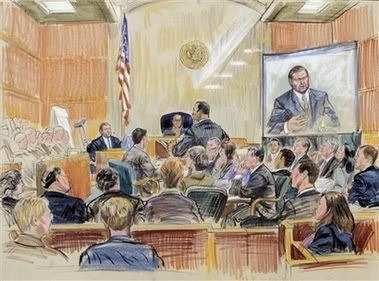
Here’s my favorite line of the Defense closing argument, as blogged by Emptywheel, from lead Libby attorney, Ted Wells, when he began to whine about not getting to have the last word (with my emphasis):
Fitzgerald goes last. But I will tell you, and say to you now, there's an extreme disadvantage to Defense, because you're not able to respond to something that will come up. I don't get to respond, but this is an important trial, and I represent an important person, so I want you to think about how I would respond. I want you to be critical thinkers. If you hear something that is new, I want you think, what would Wells and Jeffress say that is new.I don’t believe that “critical thinking” is the skill Wells is really lobbying for here. He might as well have said:
“If Fitzgerald makes an argument that is better reasoned and more compelling than the one we have given you, I want you to hallucinate the image of Wells and Jeffress giving an even better argument!”
There also seemed to be quite a bit of ego stroking in the Defense argument yesterday. In addition to reminding the jury that he represents “an important person,” Wells made a strange point of complimenting his partner:
We saw what was in essence a Perry Mason moment when my partner Bill Jeffress, one of the best lawyers in the country . . .Frankly, if I’m a juror, this line feels a bit like watching a Broadway play and having one of the actors suddenly tell the audience that his co-star deserves a Tony Award for being one of the best actors in the country.
Let’s just say that I would be very reluctant to give a glowing review of that play, no matter what else I heard during the performance!

No comments:
Post a Comment